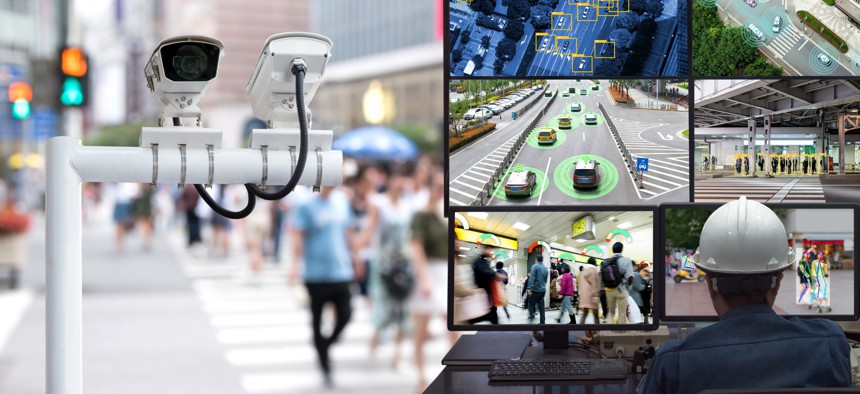Cryptocurrency Company Makes Case for Running its Own Local Government

iStock.com/JIRAROJ PRADITCHAROENKUL
A Nevada commission is studying the concept. An executive with Blockchains Inc. says its plans for an "innovation zone" won't work inside an existing county.
County sales tax paid through blockchain payments. Millions of data sensors collecting information on traffic and energy use. Only autonomous vehicles are allowed on roads.
That’s what Lee Weiss, the executive vice president of Blockchains Inc., envisions as he talks about building a smart city from the ground up. But central to the creation of such a community will be the formation of an autonomous government to manage it.
“Fitting an innovation zone community into an existing county is not reasonable,” Weiss said as he spoke recently about the radical proposal his company has backed to establish so-called “innovation zones” in Nevada.
Creating these zones will require reimagining municipal and administrative systems so that residents can collaborate and have a direct say in how the communities are run, Weiss said as he spoke during the first meeting of a state-backed special committee, which was appointed to study the innovation zone concept.
Earlier this year, Nevada Gov. Steve Sisolak pitched but later scaled back a proposal that would have allowed companies pursuing emerging technologies—like blockchain, autonomous vehicles or artificial intelligence—to develop autonomous districts. Sisolak framed the idea as a way to diversify Nevada’s tourism-driven economy, which was hit hard by the coronavirus pandemic.
Under a bill that was circulated but never introduced in the legislature, a company could qualify for an innovation zone if it owned at least 50,000 acres of land and invested at least $1.25 billion over 10 years. Over time, the technology company would take over typical government responsibilities such as tax collection, education, law enforcement and other functions.
The proposal would have directly benefited Blockchains, a cryptocurrency company that owns 67,000 acres in rural Storey County, and has proposed establishing a “smart city and innovation park” that could house 36,000 residents and 11 million square feet of commercial space.
Acknowledging skepticism, Sisolak established the special committee to study the concept and issue a report with findings and recommendations by the end of 2021.
Innovation zones have the potential to be the biggest driver of economic development in Nevada since gambling was legalized, said Pete Ernaut, the president of government and public affairs at R&R Partners, which is lobbying for the project, as he addressed state lawmakers on the committee last week. But the county government structure won’t allow the flexibility a project like this needs, he said.
“Building this from the ground up and the technology that would be necessary to run a smart city would either be cost prohibitive for a county or city to change or it could create dramatic inefficiencies,” Ernaut said.
Concern Over ‘Separate Governance’
Local government officials representing Storey County, where the Blockchains innovation zone would be located, pushed back on the insinuation that the local government structures are too rigid to work on the project.
“Separation of government is not necessary,” said Austin Osborne, Storey County’s manager. “We suggest Blockchains and others submit an application to build their project within an existing framework.”
Storey County is not opposed to the development, rather is “concerned about the separate governance piece,” said Clay Mitchell, a county commissioner.
“We’re well equipped and positioned to help vet and flesh out these lofty ideas,” said Mitchell, who questioned why the details of the development project were presented first to a state commission rather than to the county. “We are willing and able to handle this project.”
State lawmakers pressed representatives from Blockchains for more specifics on why an autonomous government is necessary, asking how tax collection would be different or how the smart city would take data privacy into account.
Taxes would be collected directly by the tax authority through a blockchain tokenized payment system, rather than being collected by a merchant and later remitted to the tax authority, Weiss said. That would require a different kind of tax collection system than local governments have in place.
He envisions decisions about energy and water usage, traffic and waste management would be driven by data collected through thousands of sensors placed throughout the city. With real-time data continuously collected, Weiss said residents would be empowered to make decisions about how emerging technology is used in the city. Encryption would be used in conjunction with blockchain technology to anonymize collected data.
“Experimentation and flexibility like that simply are not possible without the type of autonomy set forth in the innovation zone bill,” Weiss said.
The innovation zone committee will meet several times this year to discuss other elements of the project, including what daily life might look like for residents.
Andrea Noble is a staff correspondent with Route Fifty.
NEXT STORY: Oak Ridge-Made Software Platform Digitally Twins All U.S. Buildings





